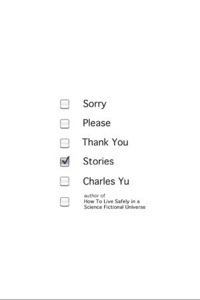 At first glance, you might peg Charles Yu’s collection Sorry Please Thank You (Pantheon) as sci-fi. A zombie wanders a big-box store, terrifying the employees. A company outsources grief, its employees feeling others’ pain for them. But these stories strive to be more than just fantasy: they want to examine the human condition.
At first glance, you might peg Charles Yu’s collection Sorry Please Thank You (Pantheon) as sci-fi. A zombie wanders a big-box store, terrifying the employees. A company outsources grief, its employees feeling others’ pain for them. But these stories strive to be more than just fantasy: they want to examine the human condition.
In “First Person Shooter,” for instance, that zombie is there not to terrorize, but for something much more mundane:
Pretty Zombie Lady holds up two different tubes of lipstick, one bloodred and one that’s more of an earth tone, and then I understand. She wants my opinion. I step back, look at her skin—which I guess is sort of a grayish baloney color—and I point to the earth-toned tube.
“Matches your blouse better,” I say.
The zombie’s quest for humanness helps humanize the shy narrator, who can’t bring himself to ask out his co-worker, Janine. As the zombie watches a video-game demo—featuring zombies as the bad guys—the narrator re-evaluates his own life:
The zombie just looks at Janine, unblinking, almost as if she wants to get her head blown off. Which, I suppose, is understandable. She started off tonight excited for a date, and then she comes in here and sees this game, and now who knows what’s happened to her self-image, to her picture of the world. Is there such a thing as a self-aware zombie? Can a zombie realize what she is? Maybe there are degrees of zombification, and she’s not quite all the way there yet. Maybe I’m partway there myself. […] I’m trying to figure out if this is the best day of work ever, or the worst. Why am I so self-conscious? What am I so scared of? It’s now or never.
“Would you like to go see a movie on Thursday?”
Other stories probe the question of what it means to be human even more explicitly. “Human for Beginners” takes the form of a manual excerpt, while “The Book of Categories” outlines a civilization’s attempt to document and categorize, and thereby understand, everything about humanity. But the collection’s main theme goes beyond the question of humanness: all of the characters in Sorry Please Thank You grapple with the possibility that what they experience—and even more terrifyingly, what they feel—isn’t real. In “Open,” the narrator and his girlfriend visit a parallel world where they can finally interact as they can’t in their own lives—but then, are they really interacting?
But it wasn’t us. I had never put my hand on the small of her back. I didn’t even like that phrase, “the small of her back,” and even as I was doing it, I felt more like I was “putting my hand on the small of her back” than actually doing it.
In “Adult Contemporary,” a hapless man named Murray visits a showroom where a salesman sells him a new life, a model called The BradTM. This new, purchased life is totally fake yet seems realer than real:
[Rick] flicks open a hidden compartment on the side of the desk and touches a button and the walls fall away. They’re still sitting at the desk but now the desk is outside, they are outside, in the middle of a very large, very dark green lawn, the grass mown immaculately, smelling so much like grass that Murray almost wonders if what he is smelling is actual grass or a laboratory-synthesized version of the odor of grass that smells even more like grass than grass itself.
That question of what’s real constantly plagues Murray:
This is it: his all-time high point. The apex of his trajectory, his moment of total freedom, the moment that Murray has been waiting for his whole life. To feel completely free and real and himself. An authentic experience. This is my real self, Murray thinks, but almost as soon as he thinks it, he wonders, who is deciding that? Himself, or some self separate from the self, and what is an authentic experience if you realize it as such while still having it? Now that Murray has labeled it as authentic, could it still be that? Who is putting these ideas into my head? And he wonders if they are even his own ideas or somehow part of The BradTM…
More than anything, Murray “wants to feel that all of it, all of this is leading toward something big, wants to feel anything, as long as it is real.” Throughout the collection, Yu and his characters wrestle with that desperate need for realness, and real feeling in particular.

At times this kind of metaphysical discussion veers into the almost unreadable, as in “Note to Self,” where a narrator corresponds with his alternate self. “What is happening right now as you read this?” one asks the other. “I feel, of course, that I am writing all of this, and it is all coming from me, but then again, how can I be sure? How can I be any more sure than you are?” And in many stories, you may be all too aware of the conceit driving the story, or the author who lurks just under the surface, threshing out these philosophical questions through the alternate selves of the characters.
But this collection poses big questions: Can there be meaning in something that isn’t real? What does “real” mean, anyway? In one of the most successful stories, Yu poses an answer, too. The narrator of “Hero Absorbs Major Damage” suffers an existential crisis when he learns he is, in fact, a character in a video game. Face-to-face with his god, Frëd—or is it merely Fred?—the narrator muses:
Maybe Frëd is really just Fred. Maybe we have been praying to a nine-year-old whose mom keeps yelling at him to clean up his room. Maybe this is all just a game […] After the end of the game, I can see it for what it was. You know what? I can know all that and still care. I can know all that and at the same time know that it matters. It has to matter. […]
That doesn’t make it any less real. That doesn’t mean we should give up down here.
In these lines, Yu might be talking about all fiction. Being real and being meaningful, Sorry Please Thank You suggests, aren’t necessarily the same thing. A story can be made up and still matter. You can know all that and still care.
Further Links & Resources
- Read the story “First Person Shooter” on Wired.
- Charles Yu on Twitter: @charles_yu
- A 2010 Author Spotlight on Yu on the New York Times Arts Beat blog.






